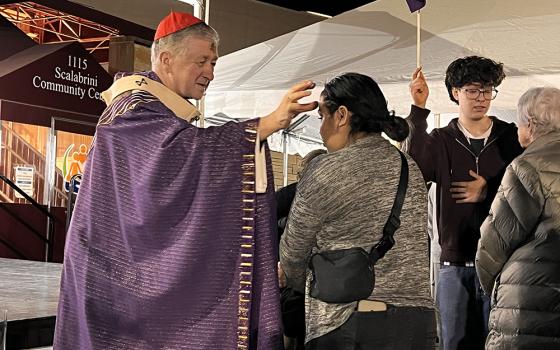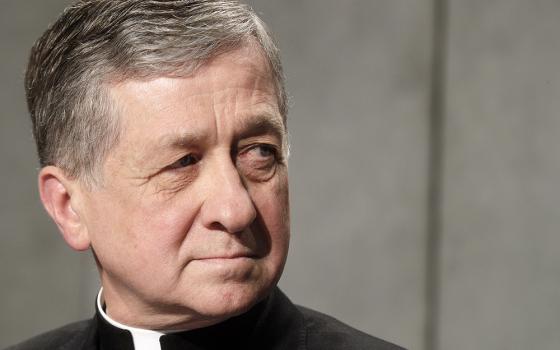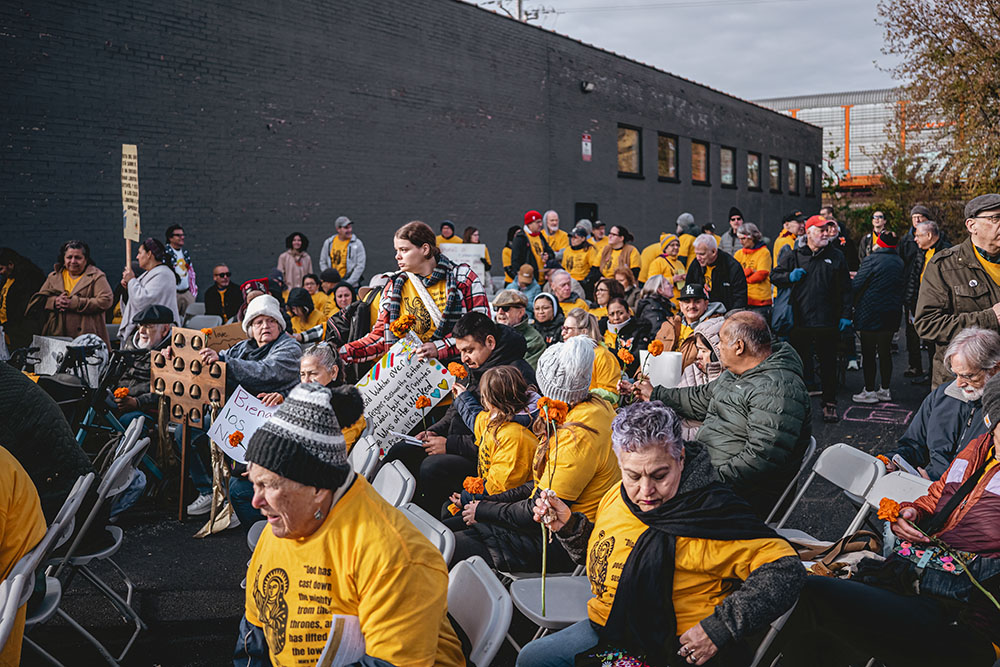
A 2,000-person crowd gathers for Mass outside the Broadview ICE Detention Center near Chicago on Nov. 1. (Courtesy of Coalition for Spiritual and Public Leadership/Bryan Sebastian)
For the second time in less than a month, federal immigration officials have refused to allow Catholic leaders to administer Communion to immigrants held inside the Broadview ICE Detention Center near Chicago — even as more than 2,000 faithful gathered outside the facility on Saturday morning, Nov. 1, to pray, sing and demand access for clergy.
The Mass, organized by the Coalition for Spiritual and Public Leadership, drew a crowd that spilled across the sidewalks of the industrial stretch outside the detention center. Aztec dancers opened the ceremony, followed by a solemn procession of more than 50 priests from the Chicago Archdiocese, deacons and women religious, who joined worshippers for an outdoor celebration of the Eucharist.
But as the crowd prayed for those inside, the group's main request — to bring Communion to detainees — was again rejected by Immigration and Customs Enforcement, echoing its refusal to the group on Oct. 11.
Chicago Auxiliary Bishop José María Garcia-Maldonado and Mercy Sr. JoAnn Persch led a small delegation toward the detention center's main checkpoint, requesting to bring Communion to the detainees. The group was escorted by Illinois State Police officers who relayed the clergy's request to ICE officials.
"The answer was no," Persch told the crowd upon returning to the outdoor altar, her voice steady but disappointed. "Sisters and brothers detained in this horrendous situation, we asked to come and bring you comfort," she said.
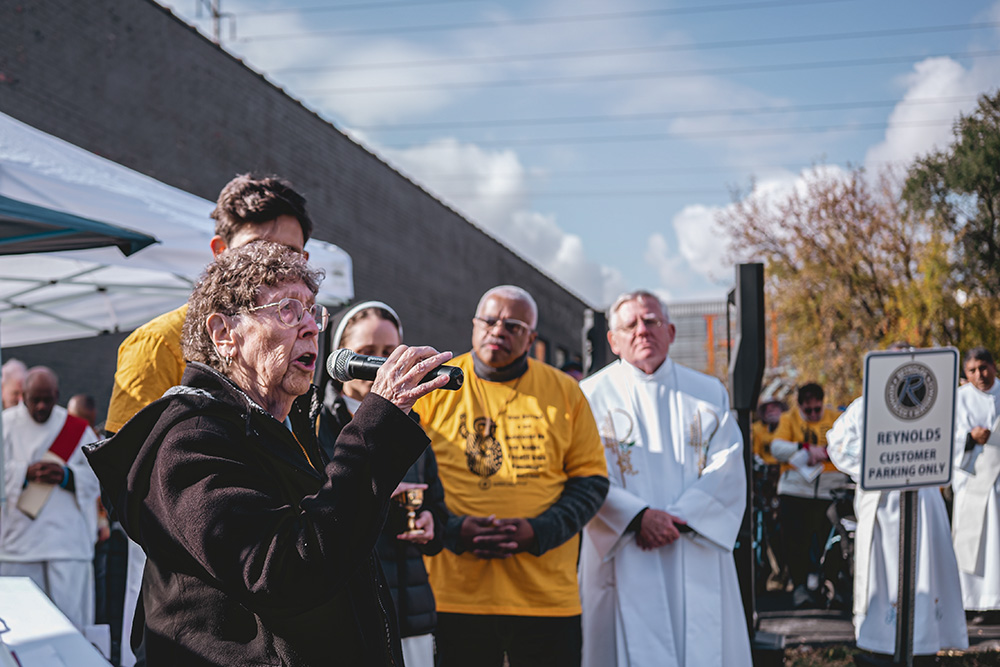
Mercy Sr. JoAnn Persch speaks to the crowd gathered for Mass outside the Broadview ICE Detention Center near Chicago Nov. 1. (Courtesy of Coalition for Spiritual and Public Leadership/Bryan Sebastian)
Persch, who is 91, has been a fixture outside the Broadview facility for decades, praying for the rights and dignity of detained immigrants. Until recently, she had been allowed inside to offer Communion. That changed, she said, under the current administration's tightened access policies.
Members of the Coalition for Spiritual and Public Leadership and its supporters argue that ICE's continued denials violate the right to religious freedom and contradict the agency's own detention standards, which guarantee access to worship for those in custody.
"Although ICE claims that their Broadview facility upholds national detention standards guaranteeing the right to worship, testimonies from those detained and their families tell a very different story, one of spiritual neglect and isolation," the coalition said in its public statement.
In a recent interview with the National Catholic Reporter, Cardinal Blase Cupich of Chicago has also criticized ICE's decision, describing it as "a violation of religious freedom" and emphasizing, "There is no harm to the government in allowing us to minister."
The Broadview gathering came just three weeks after a smaller Mass on Oct. 11, when ICE first denied the group entry. After that initial rejection, leaders of the coalition said they worked diligently to comply with federal guidance for religious visitation.
Advertisement
"We attempted for a second time to bring Communion to migrants detained there. ICE turned us away," said Jesuit Fr. David Inczauskis, who served as master of ceremonies for the All Saints' Day and Día de los Muertos Masses. "They told us they needed one week's notice. We let them know 10 days in advance," he said of the group's arrival at the center.
The group submitted a formal letter to the Department of Homeland Security and ICE Oct. 24, requesting permission for a small group of ministers to enter Broadview on Nov. 1. Mayor Katrina Thompson of Broadview also sent a letter of support the following day. ICE acknowledged neither request before the event, organizers said.
Instead, on Oct. 28, ICE officials sent a written denial citing "safety and security concerns" and "the transitory nature" of the Broadview facility — a justification the leaders of the coalition dispute. "ICE representatives further insisted that Broadview is not a detention center, even though many reports confirm that people are often held there for several days without beds," the coalition said in a statement.
The group followed up with an additional letter on Oct. 30, delivered both by email and in person to ICE's downtown Chicago office. They were told no one was available to meet with them and were warned that permission to enter Broadview would likely not be granted. No response followed.
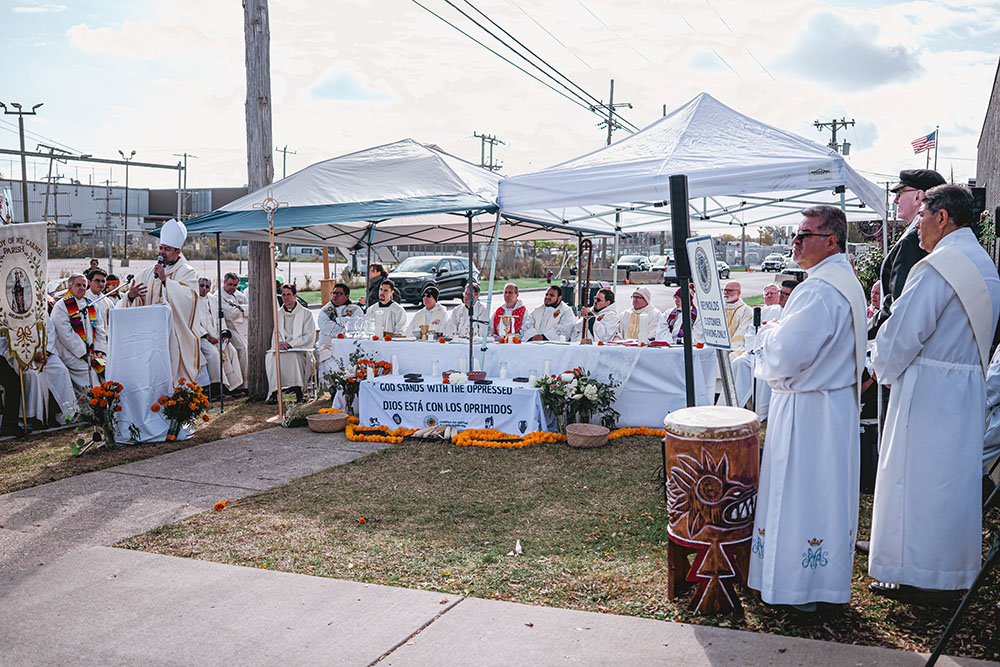
Chicago Auxiliary Bishop José María Garcia-Maldonado, at left, preaches during Mass outside the Broadview ICE Detention Center Nov. 1. (Courtesy of Coalition for Spiritual and Public Leadership/Bryan Sebastian)
"I am here today because I am also an immigrant," said Garcia-Maldonado, preaching outside the ICE facility. "My story is a story many of you here relate to. Being here today is a part of the holiness we are called to live. This is our faith."
Though ICE agents did not engage directly with the demonstrators, witnesses said federal vehicles drove repeatedly along the access road, an act many interpreted as intimidation, organizers said.
"Perhaps they don't want to allow us in because they know the conditions inside are inhumane and they know we would denounce that," said Inczauskis.
"Our request is so simple, to do something the Catholic Church does every day. We are united in Christ. We will not stop denouncing the evil of detention and deportation. We cannot be silent in the face of oppression. We will persist until justice flows freely like a river," the priest said.




